"Cherishing Little Steps - A Haven for Baby and Family Journeys"
Creative Ways to Teach Your Child About History and Culture
Exploring history and culture with your child can be like setting off on a fascinating journey filled with hidden treasures waiting to be discovered. Imagine a world where learning becomes an adventure, where the past comes alive in vibrant colors and rich stories.
There are unique ways to engage your child in these domains beyond traditional methods, sparking curiosity and a deeper understanding. Let's uncover together some inventive approaches that will not only educate but also captivate your child's imagination, fostering a lifelong love for history and diverse cultures.
Key Takeaways
- Engage children in historical role-playing games for immersive learning experiences.
- Foster cultural appreciation through hands-on cooking classes and art projects.
- Utilize virtual museum tours and storytelling to convey historical richness effectively.
- Encourage cultural engagement through music workshops, storybook readings, and art projects.
Interactive Historical Role-Playing Games
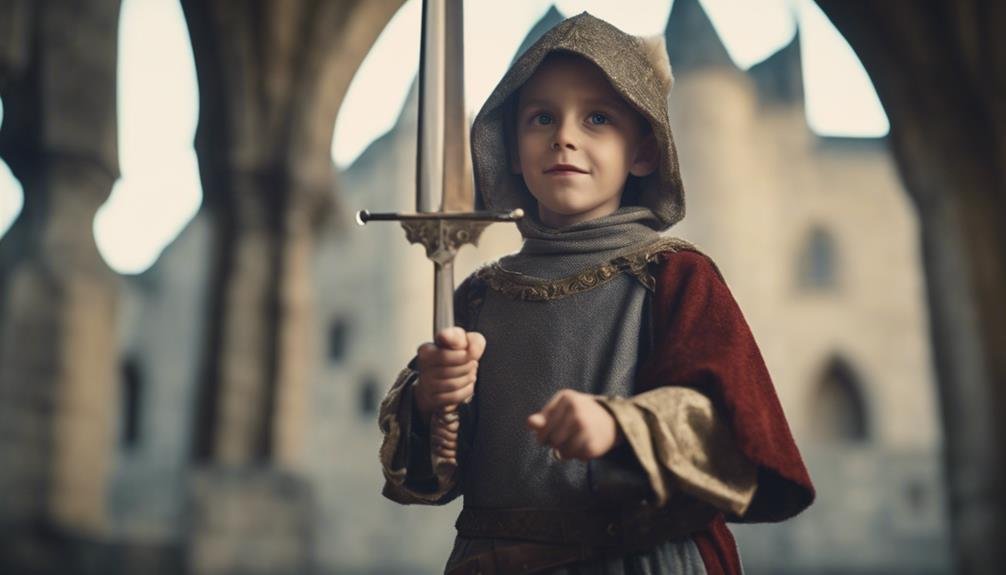
To fully engage your child in learning about history and culture, consider introducing them to interactive historical role-playing games. These educational historical games offer immersive experiences that can transport your child back in time through historical reenactments and interactive simulations. By participating in these interactive simulations, your child can gain a deeper understanding of the past while having fun and actively engaging with historical events.
Through historical role-playing games, your child can step into the shoes of different historical figures, experiencing the challenges and decision-making processes they faced. This hands-on approach allows them to connect with history on a personal level, making the learning experience more impactful and memorable. Additionally, these games can help develop critical thinking skills as your child navigates through historical scenarios, making decisions that could alter the course of history.
Cultural Cooking Classes
Consider enrolling your child in cultural cooking classes to broaden their understanding of different traditions and cuisines. These classes offer engaging experiences that combine educational elements with fun activities. Here are four reasons why cultural cooking classes can be a fantastic way to teach your child about history and culture:
- Hands-On Learning: Through cooking demonstrations and hands-on activities, children can actively participate in preparing traditional dishes, gaining a deeper appreciation for the ingredients and techniques used in different cultures.
- Cultural Exploration: By exploring diverse cuisines, children can learn about the history and customs of various regions around the world, fostering an understanding and respect for different ways of life.
- Multisensory Experience: Cooking engages all the senses, allowing children to experience the sights, smells, textures, and tastes of different foods, creating lasting memories associated with cultural diversity.
- Life Skills Development: Cultural cooking classes not only teach about history and culture but also help children develop practical skills such as following recipes, measuring ingredients, and working as a team in the kitchen.
DIY Historical Costumes
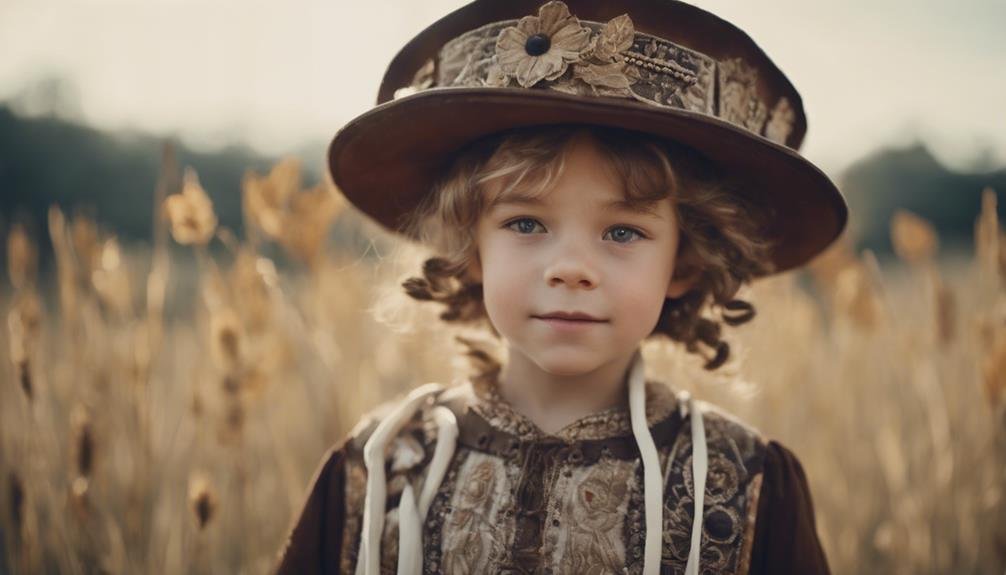
Engage your child in a hands-on exploration of history and culture by creating DIY historical costumes together. Delving into historical fashion can be a fun and educational way to learn about different time periods and the clothing styles that prevailed. Not only can this activity deepen your child's understanding of history, but it can also be a great way to prepare for costume parties or themed events.
| Time Period | Style of Clothing | Materials Needed |
|---|---|---|
| Ancient Egypt | Flowing robes | White fabric, gold trim |
| Medieval Europe | Tunics and gowns | Velvet, faux fur |
| Roaring Twenties | Flapper dresses | Fringe, sequins |
Virtual Museum Tours
Explore various museums worldwide from the comfort of your own home through immersive virtual tours that offer a unique glimpse into art, history, and culture. Virtual education has revolutionized the way we learn about the world, making museum exploration more accessible and engaging than ever before.
Here are four reasons why virtual museum tours can be a valuable tool in teaching your child about history and culture:
- Convenience: With virtual tours, you can visit museums located across the globe without leaving your home. This convenience allows you to explore different cultures and historical periods with ease.
- Interactive Learning: Virtual tours often offer interactive elements such as 360-degree views, detailed descriptions, and audio guides, enhancing the learning experience and keeping your child engaged.
- Flexible Learning Pace: Your child can explore at their own pace, pausing to investigate further into areas of interest or re-visiting exhibits as needed.
- Cost-effective: Virtual museum tours are usually free or low-cost, making them a budget-friendly option for enriching your child's understanding of history and culture.
Storytelling Through History
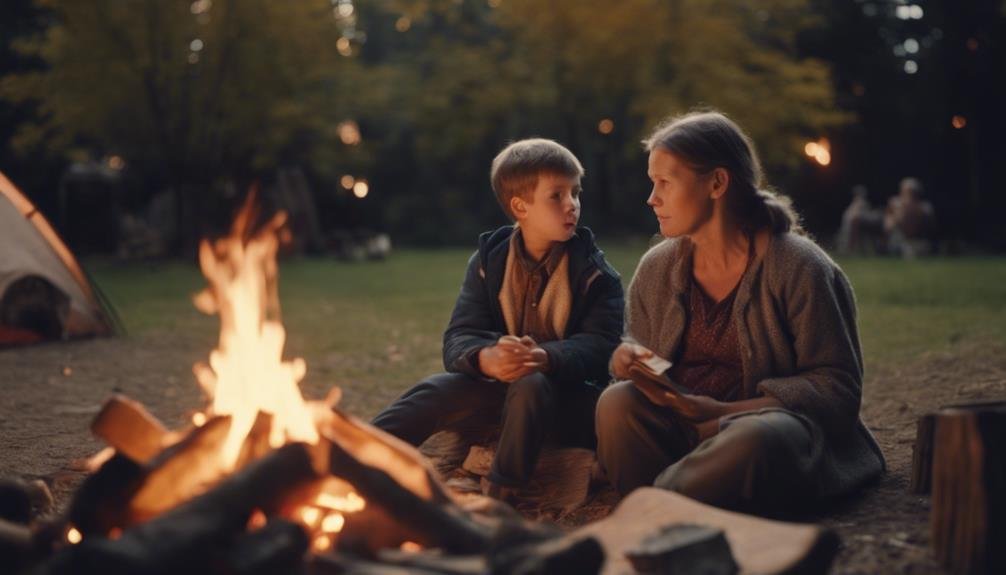
Storytelling in history serves as a powerful medium for conveying the richness and complexity of past civilizations and cultures. Through oral storytelling and historical reenactments, children can immerse themselves in the narratives of ancient times, gaining a deeper understanding of historical events and cultural traditions. Historical reenactments bring history to life, allowing children to witness firsthand the clothing, tools, and customs of different time periods. On the other hand, oral storytelling taps into the imagination, painting vivid pictures of the past through words and emotions.
| Advantages of Storytelling Through History | |
|---|---|
| 1. Engages Multiple Senses | 3. Fosters Empathy |
| 2. Encourages Critical Thinking | 4. Enhances Creativity |
Engaging in historical storytelling not only educates children about the past but also helps them develop essential skills such as critical thinking, empathy, and creativity. By incorporating oral storytelling and historical reenactments into your child's learning experience, you can make history come alive and spark a lifelong interest in different cultures and civilizations.
Cultural Music and Dance Workshops
Immerse your child in the vibrant world of history and culture through engaging Cultural Music and Dance Workshops. These workshops offer a unique opportunity for your child to explore musical exploration and experience the beauty of dance fusion.
Here are four reasons why these workshops are a fantastic way to introduce your child to history and culture:
- Interactive Learning: Through hands-on activities and interactive sessions, your child can actively engage with different musical instruments and traditional dance forms, making the learning experience dynamic and memorable.
- Cultural Appreciation: By participating in these workshops, your child can gain a deeper understanding and appreciation for diverse cultures around the world, fostering empathy and respect for different traditions.
- Creative Expression: Music and dance are powerful forms of expression. These workshops provide a platform for your child to express themselves creatively, nurturing their artistic abilities and boosting their self-confidence.
- Physical Activity: Engaging in dance workshops not only teaches your child about cultural movements but also promotes physical activity, helping them stay active and healthy while having fun exploring various dance styles.
Historical Scavenger Hunts
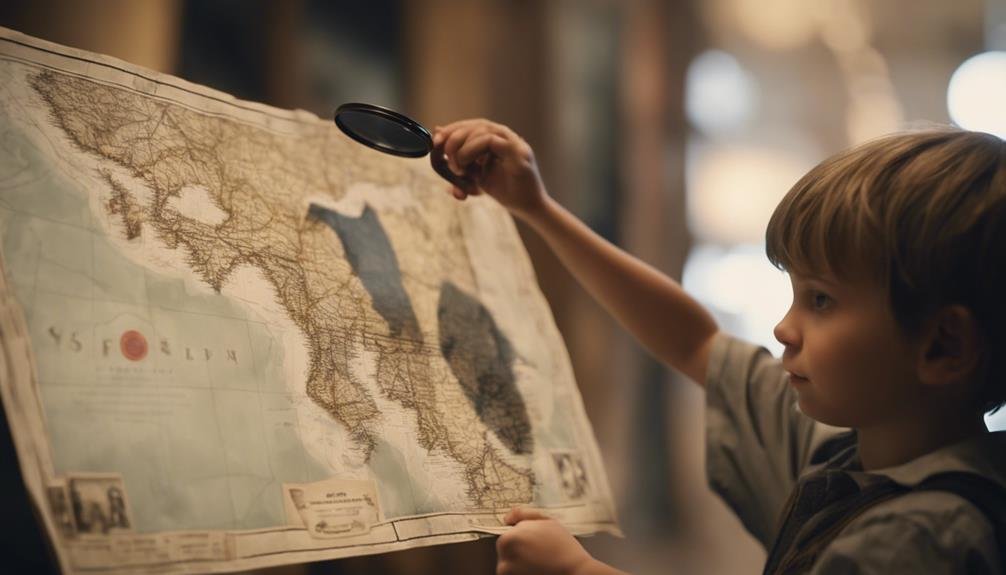
Embark on a thrilling journey through time with Historical Scavenger Hunts, where your child can actively uncover hidden clues and pieces of history in a fun and educational way. Historical reenactments, scavenger hunts, interactive museum tours, and historical escape rooms offer a hands-on approach to learning about the past. These activities not only engage your child's curiosity but also provide them with a deeper understanding of historical events and cultures.
Through historical scavenger hunts, your child can step into the shoes of people from different time periods, solving puzzles and unraveling mysteries along the way. Interactive museum tours bring artifacts to life, allowing your child to explore history in a dynamic and immersive manner. Historical escape rooms challenge your child to think critically and work as a team to unlock the secrets of the past.
Art Projects Inspired by History
Explore the rich tapestry of history through engaging art projects that draw inspiration from the past. Art has a unique way of bringing history to life for your child, allowing them to connect with different time periods and cultures in a hands-on and creative manner.
- Mixed Media Timeline: Create a visual timeline of historical events using mixed media such as paints, photographs, and text. This project can help your child understand the chronological order of events and key moments in history.
- Cultural Collage: Encourage your child to research different cultures and create a collage that represents the diversity and richness of each culture. This activity promotes cultural awareness and appreciation.
- Historical Portrait Painting: Have your child choose a historical figure they admire and paint a portrait of them. This project not only enhances their painting skills but also allows them to learn more about influential individuals from the past.
- Artifact Replication: Select a historical artifact or object and challenge your child to replicate it using clay, paper mache, or other craft materials. This hands-on activity helps them understand the significance of artifacts in preserving history.
Cultural Storybook Reading Sessions
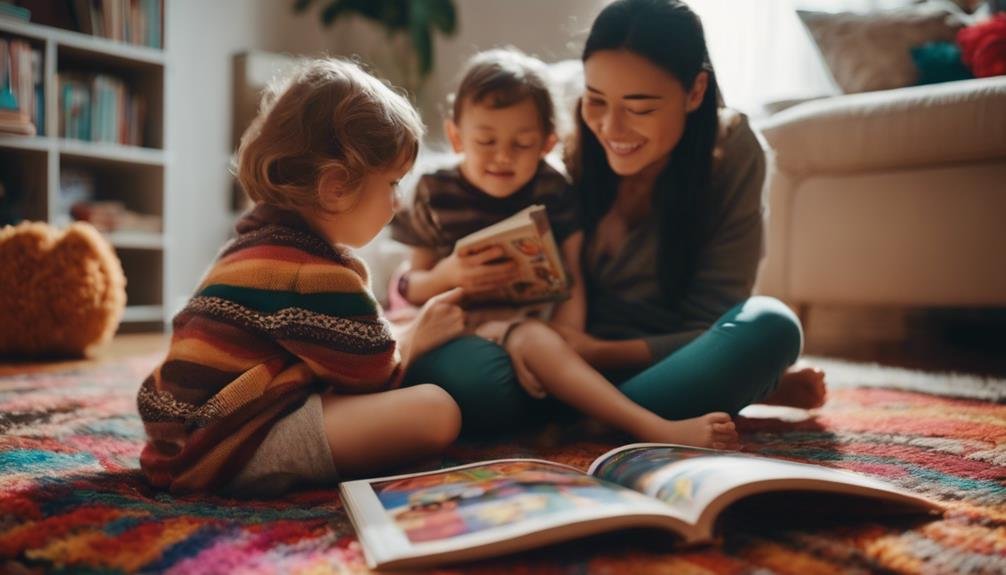
Engage your child in enriching Cultural Storybook Reading Sessions that invite exploration of diverse narratives and traditions. These sessions not only foster a love for reading but also provide a gateway to understanding different cultures and histories. Through folklore exploration, your child can immerse themselves in tales passed down through generations, learning about the values and beliefs of various communities around the world. Additionally, incorporating heritage crafts into the reading sessions can make the experience even more interactive and memorable. By creating crafts inspired by the stories they read, your child can engage with the material in a hands-on way, reinforcing their understanding of the cultural aspects presented in the books.
| Benefits of Cultural Storybook Reading Sessions | |
|---|---|
| 1. Enhances cultural awareness | 2. Encourages creativity |
| 3. Promotes empathy and understanding of diverse perspectives |
These sessions provide a holistic approach to learning about history and culture, making the experience both educational and enjoyable for your child.
Visit Historical Landmarks
To deepen your child's understanding of history and culture, consider visiting historical landmarks that offer tangible connections to the past. Exploring these sites can provide a unique and enriching experience for both you and your child. Here are some tips to make the most out of your visit:
- Engage in Guided Tours: Opting for guided tours can enhance your child's learning experience by providing detailed information and context about the historical significance of the landmark.
- Participate in Hands-On Activities: Many historical landmarks offer hands-on activities such as traditional crafts, interactive exhibits, or reenactments that allow your child to immerse themselves in the culture of the past.
- Encourage Questions and Discussions: Encourage your child to ask questions and engage in discussions with tour guides or fellow visitors to deepen their understanding and critical thinking skills.
- Capture Memories: Encourage your child to take photos or keep a journal to document their experiences and create lasting memories of the visit.
Cultural Exchange Programs
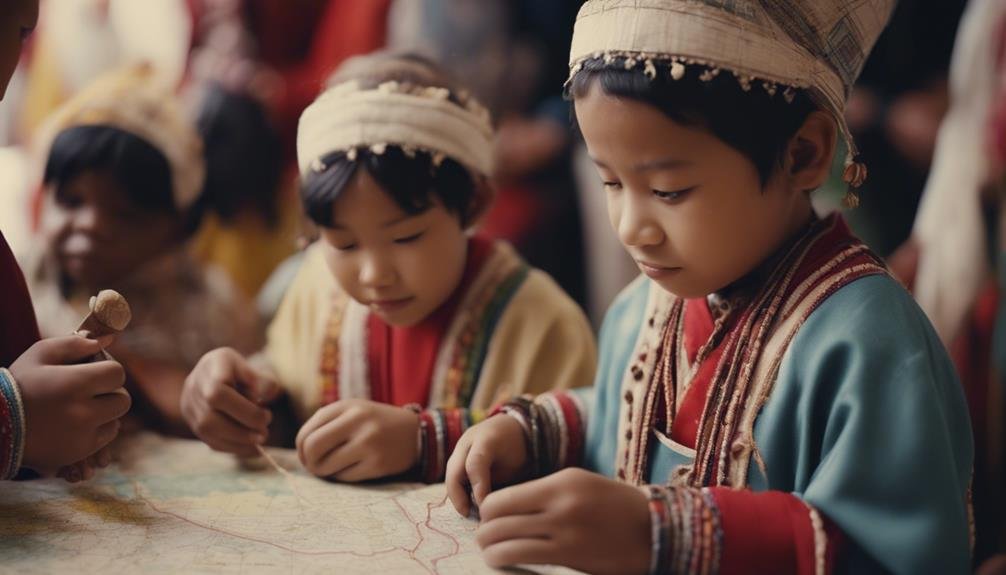
Engage in cultural exchange programs to broaden your child's horizons and foster a deeper appreciation for diverse traditions and customs. One fantastic way to participate in these programs is through language immersion experiences. By enrolling your child in a language immersion program, they can't only learn a new language but also immerse themselves in the culture associated with it. This hands-on approach allows children to gain a profound understanding of different ways of life and enhances their cultural sensitivity.
Another engaging method is to connect your child with a pen pal from a different country or cultural background. Pen pal relationships provide a unique opportunity for kids to learn about another culture firsthand, exchange ideas, and develop friendships across borders. Through letters, emails, or even video calls, children can share their own customs while learning about the traditions and daily life of their pen pal.
Historical Movie Nights
Immerse your child in the past with engaging historical movie nights that bring history to life right in your living room. These movie nights can be both entertaining and educational, allowing your child to learn about different time periods and cultures in a fun and interactive way.
Here are some tips to make your historical movie nights a success:
- Choose Movies Wisely: Select historically accurate films that depict events or time periods you want your child to learn about.
- Create a Movie Trivia Game: Before or after watching the movie, engage your child with a fun trivia game related to the film's historical context.
- Encourage Historical Reenactments: After watching a movie, encourage your child to reenact a scene or event from the film to deepen their understanding.
- Discuss and Reflect: Take time to discuss the movie together, sharing thoughts on what was accurate, what was dramatized, and how it reflects real historical events.
Frequently Asked Questions
How Can Parents Incorporate Historical and Cultural Education Into Everyday Activities at Home?
To incorporate historical and cultural education into everyday activities at home, you can engage your child in hands-on activities and interactive games. These methods make learning fun and memorable, fostering a deeper understanding of the past.
Are There Any Online Resources or Apps That Can Aid in Teaching Children About History and Culture?
You can find a plethora of interactive websites, educational apps, virtual museum tours, and cultural games online. These resources offer engaging ways to teach your child about history and culture, making learning fun and accessible.
How Can Parents Ensure That Their Child Retains the Information Learned From These Creative Methods?
To guarantee your child retains information, engage them in regular discussions about what they've learned. Use quizzes or games as assessment methods. Encourage interactive learning through hands-on activities. Connect history and culture to their daily life experiences for better retention.
Are There Any Specific Historical Periods or Cultures That Are Particularly Beneficial for Children to Learn About?
Exploring ancient civilizations through interactive learning can spark curiosity in your child. Investigate global traditions with hands-on projects to make history come alive. These experiences can cultivate a deep appreciation for diverse cultures.
How Can Parents Adapt These Activities for Children With Different Learning Styles or Special Needs?
To adapt activities for diverse learners, consider differentiation strategies like providing varied materials, modifying tasks, and offering multiple ways to demonstrate understanding. Inclusive adaptations can include sensory supports, visual aids, and personalized accommodations.
Conclusion
To wrap up, incorporating creative and interactive methods is essential in making history and culture come alive for your child.
By engaging in activities such as historical role-playing games, cultural cooking classes, and virtual museum tours, you can set off on a journey back in time to experience the past in a fun and engaging way.
So why not grab your time machine and set out on a journey through history and culture with your little explorer?



fatimata grases